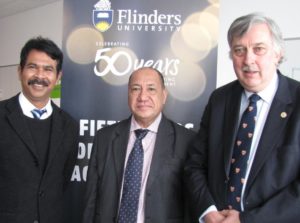
Investment in Timor-Leste’s youth and other human resources is critical to the young nation’s future, the Minister of State Mr Agio Pereira told a Flinders conference this week.
Mr Pereira was at Flinders at Tonsley for the Australian launch of the UN-sponsored Timor-Leste Human Development Report Project, a collaboration between the emerging Southeast Asian country’s Government, UN Development Program and Flinders University.
The two-year project will focus on the wellbeing of East Timorese youth in this rapidly growing 14-year-old sovereign state.
Since its formation in 2002, Timor-Leste’s population has grown from 880,000 to 1.2 million, raising the need for intensive input into education and development of the younger generations.
Mr Pereira said his country had grown rapidly since winning independence from Portugal and Indonesia.
This nation-building collaboration will pave the way for some important and sustainable ongoing community developments in Timor-Leste, as the country seeks to “pass responsibilities” on to the next generations, he said.
“The government’s door is always open to get this important job done,” Mr Pereira said.
“We look forward to working with the Flinders team on the ground to roll out initiatives where they’re urgently needed.”
Experts at Flinders University’s School of the Environment, led by demographer Dr Udoy Saikia, are managing the Timor-Leste Human Development Report Project.
They include Flinders Associate Professor Gour Dasvarma, Dr James Chalmers and a postgraduate Ms Merve Hosgelen.
Dr Saikia said the project was the start of further nation building work in Asia’s newest nation.
“The proposed theme for 2016-17 is transitioning to a demographic dividend and planning economic opportunities for a youthful population,” Dr Saikia said.
“The project will cover a nation-wide survey covering all the districts of Timor-Leste.
“We strongly believe that this project will give us an excellent opportunity to further strengthen Flinders University’s leadership role not only in Timor-Leste but also in the Asia-Pacific region as a whole.”
The United Nations gave an update on the 2016 Youth Wellbeing Survey in late August.
Dr Saikia said the Applied Population Studies team at Flinders has also contributed to three other human development reports – for Bougainville, PNG, Assam in India, and for Vietnam.
Deputy Vice-Chancellor (Academic) Professor Andrew Parkin said Flinders University was very proud to be involved with these projects, and announced a $25,000 research grant to the East-Timor project’s rollout.
Mr Pereira and other overseas visitors, including the President of Malta Marie-Louise Coleiro Preca, visiting Flinders at Tonsley this week as part of the School of Education Student Wellbeing and Prevention of Violence (SWAPv) Conference.
Timor-Leste and Malta are among a range of countries adapting an antibullying program developed by the SWAPv Research Centre at Flinders.

